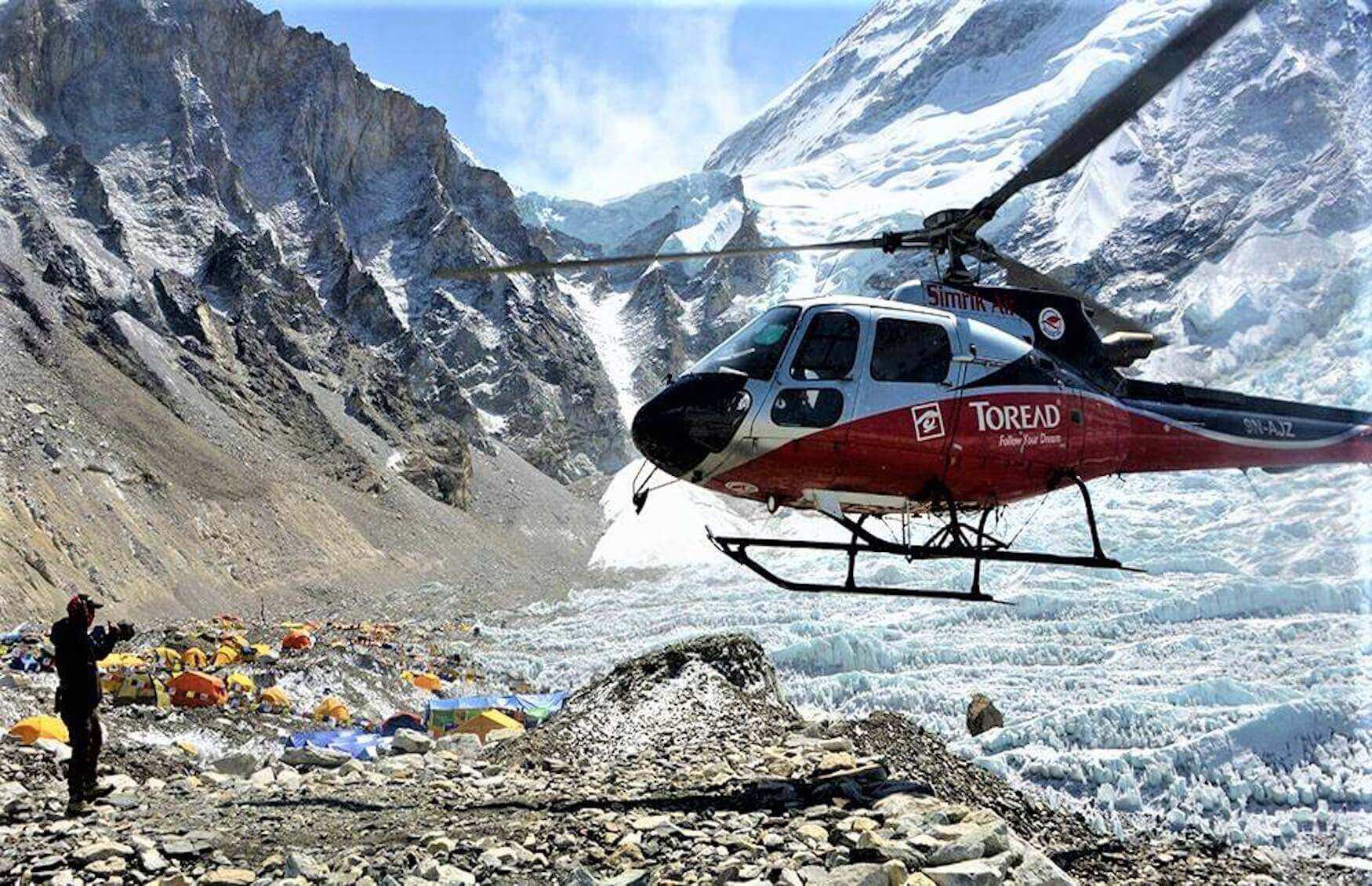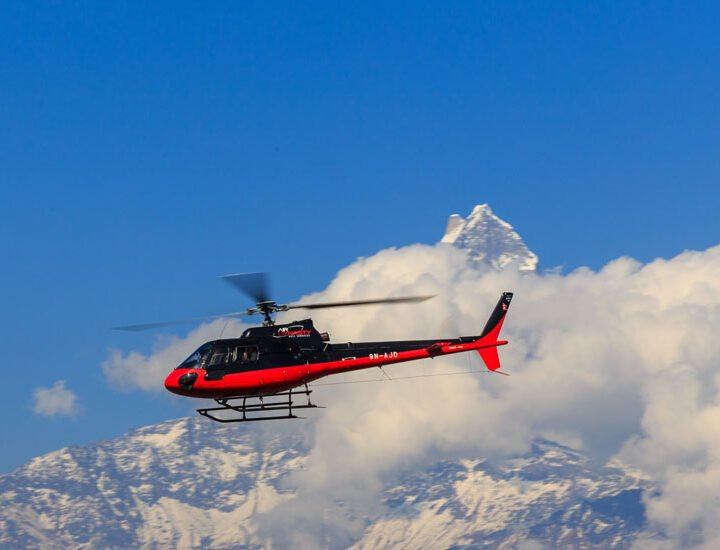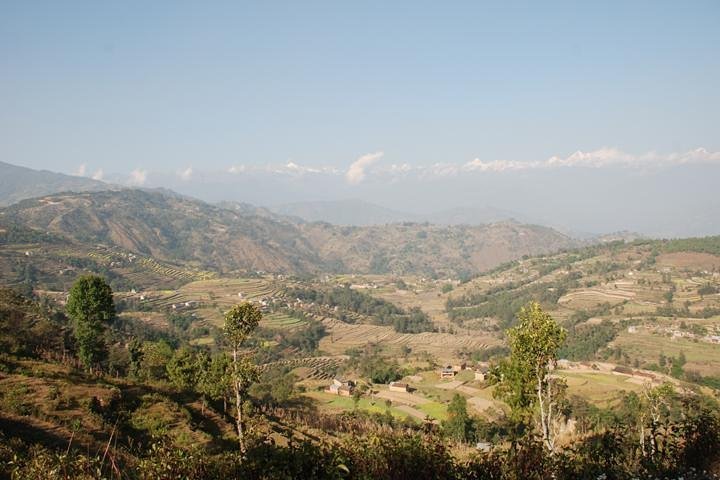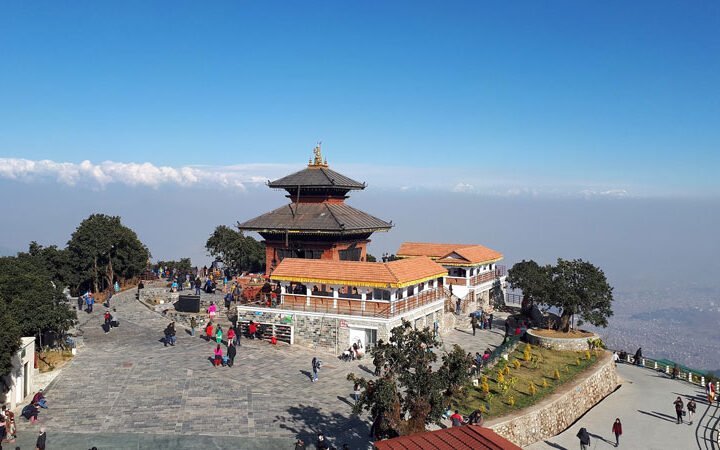- Details
Detailed itinerary
Itinerary- Tour Includes/Excludes
- Useful Info
- FAQ
Trip overview
Everyone dreams of catching a glimpse of the highest peak in the world. However, not everyone has the time or physical attributes to commence on a 2-week long trek to the Everest Base Camp.
However, you need not worry! Golden Himalayan Zone offers Everest Base Camp Helicopter Tour to make your dream come true. The flight features the view of Mount Everest (8848 meters) in just one day.
The helicopter tour takes you to the foothill of the majestic mountain easily and conveniently. The Everest Base Camp lies at the stunning height of 5464 meters. The base camp itself is a fantastic vantage point to appreciate the Everest.
Meanwhile, the actual trek to EBC takes no less than 15 days. As the most popular base camp trek, the route is often crowded. The helicopter tour, therefore, provides a great alternative. Sit back and relax as the flight takes you through dreamy clouds and onto the face of Everest.
Likewise, the tour captures possibly the best scenes of other peaks like Makalu (8481m) and Lhotse (8516m). As the journey starts from Kathmandu, you will gradually witness the change in the landscape. In other words, the flight glides from temperate green hills to rather alpine snowy peaks.
Everest Base Camp Helicopter Tour is accessible mostly from March to December. On a clear day, there are no chances of change in the itinerary. However, if there is any weather problem or air traffic, the flight timing can change.
Tour Highlights
- Witness the closest look on Mount Everest.
- Embrace iconic scenes of peaks like Lhotse, Nuptse, and Pumori.
- Step onto one of the world’s most fabulous viewpoints, Kalapatthar offering a panoramic view of the Himalayan range.
- Experience ecological diversity with rhododendron forests, glaciers, snowy lakes, and more.
Itinerary
Everest Base Camp Helicopter Tour starts from Kathmandu. The journey begins early as you head to the airport at 6 am. Make sure that you have your passport copy with you before you leave for the airport.
You will check-in at the helicopter counter. The flight from Tribhuvan International Airport to Lukla Airport takes about an hour. At 7:30 am, the helicopter will refuel at Lukla. Here, the pilot also does weight assessment. Usually, a single shuttle can hold 250 kg at once. Hence, three people fit this category.
For a double shuttle, the max limit is 500 kg, so; five people fit in it. The limit, however, decreases to 240 kilograms after reaching 4000 m elevation. Following that, the flight takes off after 20 minutes towards the Everest Base Camp over the Dudhkoshi River.You will fly above the Everest Base Camp, and land at Kalapatthar (5400m) at 8:25 am.
From Kalapatthar, the view of the Everest is spectacular. Enjoy the stunning views and take pictures and videos for memory with your loved ones.
After 30 minutes, you will fly towards Everest View Hotel, where you have an option to have breakfast while enjoying the stunning views. At 9:35 am, the flight goes back to Kathmandu through the same route.You will be back in Kathmandu 10 minutes before noon. Then, our staff will take you back to your hotel around 1:15 pm.
Included
- Airport transfers in Kathmandu
- Domestic flights to and from Lukla
- Trekking permits and national park fees
- Accommodation and meals during the trek
- Licensed trekking guide and porter
- Trekking equipment and gear (e.g., sleeping bag, trekking poles, etc.)
- Scenic helicopter flight from Gorak Shep to Kalapatthar
- Aerial views of Mount Everest and surrounding peaks
- Fly back to Kathmandu by helicopter
Excluded
- International flights to and from Kathmandu
- Travel insurance
- Personal expenses (e.g., snacks, drinks, souvenirs)
- Tips for the trekking staff and helicopter crew
Useful Info
- Best season: The best time to trek to Everest Base Camp is during the spring (March to May) and autumn (September to November) seasons. During these months, the weather is generally clear and stable, and the views are stunning.
- Trekking permits: You will need to obtain a TIMS (Trekkers Information Management System) card and a Sagarmatha National Park permit to trek to Everest Base Camp. These permits can be obtained from the Nepal Tourism Board in Kathmandu or from the local authorities in the Khumbu region.
- Altitude sickness: Altitude sickness is a common problem for trekkers in the Everest region, so it's important to take proper precautions. It's recommended to take a gradual ascent, stay hydrated, and listen to your body. If you experience symptoms of altitude sickness, such as headaches, nausea, or dizziness, it's important to rest and seek medical attention if necessary.
- Accommodation: Accommodation during the trek is typically in teahouses or lodges, which offer basic but comfortable rooms and meals. It's recommended to bring a sleeping bag and warm clothes as temperatures can drop at night.
- Hiring a guide and porter: Hiring a licensed trekking guide and porter can be helpful for managing the trek and carrying your gear. They can also provide local insights and ensure that you are taking the necessary precautions to avoid altitude sickness.
- Physical fitness: The trek to Everest Base Camp is physically demanding, so it's recommended to engage in regular exercise and training before the trek. Cardiovascular exercises such as hiking, running, and cycling can help prepare your body for the trek.
- Helicopter tour: The Kalapatthar Heli Tour offers stunning views of Mount Everest and surrounding peaks, and can be a great way to end the trek. It's important to dress warmly and bring a camera to capture the stunning views.
FAQs
-
How long does the trek take?
The trek from Kathmandu to Everest Base Camp with a Kalapatthar Heli Tour typically takes around 12 to 14 days, depending on the itinerary and group's fitness level.
-
Is previous trekking experience required?
While previous trekking experience is not required, it's recommended to have a good level of physical fitness and endurance, as the trek can be physically demanding.
-
Do I need travel insurance?
Yes, it's recommended to have travel insurance that covers emergency medical evacuation, as well as any unforeseen events that may occur during the trek.
-
What kind of accommodation is available during the trek?
Accommodation during the trek is typically in teahouses or lodges, which offer basic but comfortable rooms and meals.
-
What kind of food is available during the trek?
Teahouses and lodges typically offer a variety of local and western dishes, including rice, noodles, soups, curries, and more. Vegetarian and vegan options are also available.
-
Is it possible to trek to Everest Base Camp without a guide?
While it's possible to trek to Everest Base Camp without a guide, it's recommended to hire a licensed guide and porter, as they can provide local insights and ensure that you are taking the necessary precautions to avoid altitude sickness.
-
What kind of weather can I expect during the trek?
Weather in the Everest region can be unpredictable, with temperatures ranging from hot and humid to cold and windy. It's recommended to pack layers and be prepared for a variety of weather conditions.






